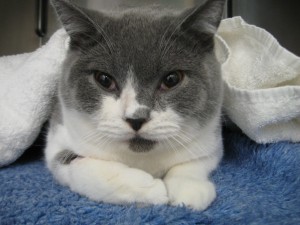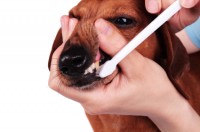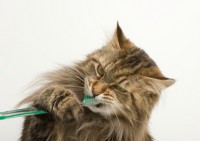Parvovirus causes severe vomiting and diarrhoea and is very contagious. The virus may infect a whole litter of pups from an unvaccinated bitch. Dogs less than one year old are the most vulnerable to the virus.
Dogs go off their food and start to vomit within a few days of infection. An astute owner will notice a drop in appetite, depression, and fever before the vomiting and diarrhoea start. The diarrhoea often contains blood and mucus, and many dogs suffer severe pain in the belly.
 How does a dog become infected with parvovirus?
How does a dog become infected with parvovirus?
The faeces of an infected dog is high in virus. Direct contact between dogs is not required to spread the virus.
Another dog is infected by licking the virus off food dishes, hair, the ground, shoes, clothes, tyres or other objects. The virus survives for years in backyards.
How do we know it is parvovirus?
We suspect parvovirus in any vomiting dog, particularly if they are unvaccinated and young. A rapid test for virus in the faeces confirms the infection. Occasionally, even though a dog has parvovirus the test is negative because the virus has not travelled all the way down the intestine. If we still strongly suspect parvovirus we treat the pup in the isolation ward and retest later.
Can it be treated successfully?
No treatment kills the virus. We treat the dog symptomatically to replace lost fluids, rebalance electrolytes and prevent septicaemia. The virus causes loss of the lining of the intestinal tract. This results in severe dehydration and electrolyte imbalances, and allows bacteria to get into the bloodstream and cause septicaemia.
Pain relief and drugs to control the vomiting are often necessary.
Most dogs with parvovirus recover with aggressive treatment as long as it is begun before severe septicaemia and dehydration occur. Some breeds, notably the Rottweiler, have a much higher fatality rate than other breeds.
Can it be prevented?
Routine vaccination provides excellent protection against parvovirus. We vaccinate pups at 6-8 weeks, 10-12 weeks and then again at 14-16 weeks. In a parvovirus epidemic vaccination at two week intervals is recommended. Rottweilers and pups in an infected yard may need an additional booster at 18 to 20 weeks of age. A booster 12 months after the initial series of vaccinations and then every 3 years protects most dogs against infection.
Bitches should be vaccinated before whelping so that puppies are protected for the first vulnerable weeks of life
How do we kill the virus in the environment?
Disinfect food and water bowls, floors, towels and other contaminated items with chlorine bleach or a glutaraldehyde-based disinfectant at the recommended dilution.
Parvovirus is not transmissible to cats or humans.
 Don’t be tempted to medicate your off-colour cat with paracetamol this holiday season. Paracetamol at any dose is deadly to cats.
Don’t be tempted to medicate your off-colour cat with paracetamol this holiday season. Paracetamol at any dose is deadly to cats.




